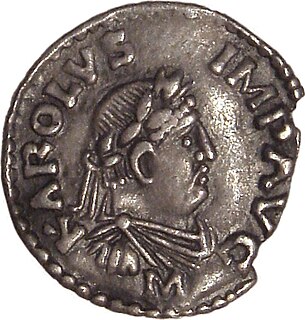
Charlemagne or Charles the Great was King of the Franks from 768, King of the Lombards from 774, and Emperor of the Romans from 800. During the Early Middle Ages, Charlemagne united the majority of western and central Europe. He was the first recognised emperor to rule from western Europe since the fall of the Western Roman Empire around three centuries earlier. The expanded Frankish state that Charlemagne founded is known as the Carolingian Empire. He was later canonised by Antipope Paschal III, but that was later treated as invalid, and he is now regarded as beatified, which is a step on the path to sainthood, by the mainstream Catholic Church.

Charles Martel was a Frankish statesman and military leader who, as Duke and Prince of the Franks and Mayor of the Palace, was the de facto ruler of Francia from 718 until his death. He was a son of the Frankish statesman Pepin of Herstal and Pepin's mistress, a noblewoman named Alpaida. Charles, also known as "The Hammer", successfully asserted his claims to power as successor to his father as the power behind the throne in Frankish politics. Continuing and building on his father's work, he restored centralized government in Francia and began the series of military campaigns that re-established the Franks as the undisputed masters of all Gaul. According to a near-contemporary source, the Liber Historiae Francorum, Charles was "a warrior who was uncommonly [...] effective in battle".

Year 754 (DCCLIV) was a common year starting on Tuesday of the Julian calendar. The denomination 754 for this year has been used since the early medieval period, when the Anno Domini calendar era became the prevalent method in Europe for naming years.
Pepin II, commonly known as Pepin of Herstal, was a Frankish statesman and military leader who de facto ruled Francia as the Mayor of the Palace from 680 until his death. He took the title Duke and Prince of the Franks upon his conquest of all the Frankish realms.

Austrasia was a territory which formed the north-eastern section of the Merovingian Kingdom of the Franks during the 6th to 8th centuries. It was centred on the Meuse, Middle Rhine and the Moselle rivers, and was the original territory of the Franks, including both the so-called Salians and Rhineland Franks, which Clovis I conquered after first taking control of the bordering part of Roman Gaul, now northern France, which is sometimes described in this period as Neustria.

Carloman was the eldest son of Charles Martel, majordomo or mayor of the palace and duke of the Franks, and his wife Chrotrud of Treves. On Charles's death (741), Carloman and his brother Pepin the Short succeeded to their father's legal positions, Carloman in Austrasia, and Pepin in Neustria. He was a member of the family later called the Carolingians and it can be argued that he was instrumental in consolidating their power at the expense of the ruling Merovingian kings of the Franks. He withdrew from public life in 747 to take up the monastic habit, "the first of a new type of saintly king," according to Norman Cantor, "more interested in religious devotion than royal power, who frequently appeared in the following three centuries and who was an indication of the growing impact of Christian piety on Germanic society".

Neustria was the western part of the Kingdom of the Franks.

Carloman I, also Karlmann, was king of the Franks from 768 until his death in 771. He was the second surviving son of Pepin the Short and Bertrada of Laon and was a younger brother of Charlemagne. His death allowed Charlemagne to take all of Francia and begin his expansion into other kingdoms.

The Carolingian dynasty was a Frankish noble family named after Charlemagne, grandson of mayor Charles Martel and descendant of the Arnulfing and Pippinid clans of the 7th century AD. The dynasty consolidated its power in the 8th century, eventually making the offices of mayor of the palace and dux et princeps Francorum hereditary, and becoming the de facto rulers of the Franks as the real powers behind the Merovingian throne. In 751 the Merovingian dynasty which had ruled the Germanic Franks was overthrown with the consent of the Papacy and the aristocracy, and Pepin the Short, son of Martel, was crowned King of the Franks. The Carolingian dynasty reached its peak in 800 with the crowning of Charlemagne as the first Emperor of the Romans in the West in over three centuries. His death in 814 began an extended period of fragmentation of the Carolingian Empire and decline that would eventually lead to the evolution of the Kingdom of France and the Holy Roman Empire.

Childeric III was King of Francia from 743 until he was deposed by Pope Zachary in March 751 at the instigation of Pepin the Short. Although his parentage is uncertain, he is considered the last Frankish king from the Merovingian dynasty. Once Childeric was deposed, Pepin the Short, who was the father of emperor Charlemagne, was crowned king, initiating the Carolingian dynasty.
Under the Merovingian dynasty, the mayor of the palace was the manager of the household of the Frankish king.

Francia, also called the Kingdom of the Franks, Frankish Kingdom, Frankland or Frankish Empire, was the largest post-Roman barbarian kingdom in Western Europe. It was ruled by the Franks during Late Antiquity and the Early Middle Ages. After the Treaty of Verdun in 843, West Francia became the predecessor of France, and East Francia became that of Germany. Francia was among the last surviving Germanic kingdoms from the Migration Period era before its partition in 843.
The Pippinids and the Arnulfings were two Frankish aristocratic families from Austrasia during the Merovingian period. They dominated the office of mayor of the palace after 687 and eventually supplanted the Merovingians as kings in 751, founding the Carolingian dynasty.

Pepin the Short, also called the Younger was King of the Franks from 751 until his death in 768. He was the first Carolingian to become king.
Drogo was a Frankish nobleman, the eldest son of Pippin of Heristal and Plectrudis. He was the duke of Champagne from the early 690s.
Pepin, or Pippin the Hunchback was a Frankish prince. He was the eldest son of Charlemagne and noblewoman Himiltrude. He developed a humped back after birth, leading early medieval historians to give him the epithet "hunchback". He lived with his father's court after Charlemagne dismissed his mother and took another wife, Hildegard. Around 781, Pepin's half brother Carloman was rechristened as "Pepin of Italy"—a step that may have signaled Charlemagne's decision to disinherit the elder Pepin, for a variety of possible reasons. In 792, Pepin the Hunchback revolted against his father with a group of leading Frankish nobles, but the plot was discovered and put down before the conspiracy could put it into action. Charlemagne commuted Pepin's death sentence, having him tonsured and exiled to the monastery of Prüm instead. Since his death in 811, Pepin has been the subject of numerous works of historical fiction.
Gerberga was the wife of Carloman I, King of the Franks, and sister-in-law of Charlemagne. Her flight to the Lombard kingdom of Desiderius following Carloman's death precipitated the last Franco-Lombard war, and the end of the independent kingdom of the Lombards in 774.
The Vita Dagoberti is an anonymous Latin biography of Dagobert III, king of the Franks (711–716). It is unreliable as a historical source. Confusing Dagobert III and the assassinated Dagobert II, the author mistakenly treats Dagobert III as a Christian martyr. The Vita is thus a saint's life, although its subject was not a saint.

The Battle of Lucofao was the decisive engagement of the civil war that afflicted the Frankish kingdoms during and after the reign of Dagobert II (676–79). In the battle, the Neustrian forces of Theuderic III and his majordomo Ebroin defeated the forces of Austrasia under the dukes Pippin and Martin.
Arnulf was the oldest son of Drogo, Duke of Champagne, and succeeded his father as duke in 707. His mother was Adaltrudis and his parents were married around 690. He was named after Bishop Arnulf of Metz, his great-great-grandfather. He is the first known Arnulf in his family, the Pippinids, after the bishop.